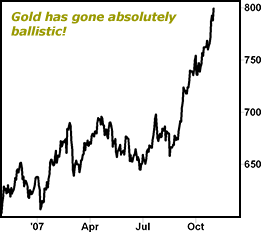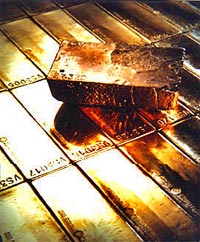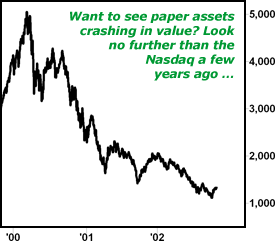Gold $800! Hard Money Wins Again!
Commodities / Resources Investing Nov 01, 2007 - 01:07 PM GMT Larry Edelson writes: They called it "a relic of the past."
Larry Edelson writes: They called it "a relic of the past."
They described its last major price surge as an "anomaly."
They said it would "never hit $800 again."
They were talking about gold.
And they were wrong.
Yesterday, exactly 54 minutes and 17 seconds past 2 P.M. Eastern Time, an event took place that even the most skeptical of investors cannot — and must not — ignore:
The December contract for gold bullion surpassed the $800 mark.
A minute later it was at $800.90. And within a time frame that could come a lot sooner than anyone now dreams possible, it could surpass $1,000.

Suddenly and inexplicably, the skeptics are gone. Suddenly, everyone is starting to talk about gold again. Only this time, they're believers. This time, they're not calling it gold; they're calling it "hard money." This time, they say, is different from past gold rallies.
And this time, on that score, they're right — this rally in gold has a different face.
It's much stronger … should prove much more enduring … and unlike the last time the yellow metal surpassed $800 an ounce, this time it will continue much higher.
My forecast: Expect a rise of another 1,400 dollars higher — to more than $2,200 per ounce!
And the fact that the Fed remains so committed to lowering interest rates — as they proved yesterday with their quarter-point cut — only makes me more confident in my forecast.
The Reasons for Gold's Strong Rally Are Not All that Different from The Forces Behind Its Past Rallies!
For the last 5,000 years, the yellow metal has been propelled higher by many of the same causes. Today, the reasons are …
 |
| Gold has been "hard money" for thousands of years … |
#1. Paper money is being systematically devalued by central bankers and politicians, especially in the U.S.
#2. The private sector and investors are losing confidence in governments all over the world.
#3. Geopolitical strife is more prevalent than it has been in the last 30 years.
#4. The wild, out-of-control spending and debt accumulating that's ingrained in today's culture, especially in the U.S.
And all of this is occurring as global gold production continues to dwindle in some regions of the world. Example: South Africa where production fell to the lowest level in 85 years!
The key to understanding gold today — and indeed, virtually all natural resources — is to understand how the public has gotten burned in the past. So let's take a walk into the forest of paper assets, and look at some recent examples …
The Time: The Middle of 1998
The Places: Thailand and the former Soviet Republic
Strange bedfellows you might think. But not really. Moscow was reeling under an estimated $150 billion worth of publicly issued IOUs, debt they had accumulated when the Berlin Wall fell and the former Soviet Republic turned into a splintered group of free-market Russian states.
The debt, mostly issued with the intent of building infrastructure for the new Russia, was for the good of the country's new 146 million capitalists.
However, corruption at so many levels in the government resulted in waste and bureaucratic nightmares. Projects either never got off the ground or ended up lining the pockets of the oligarchs who effectively printed their own money with assets previously owned by the state.
End result: The sovereign debts of the new Russia quickly went bad, and for the next five years Russia collapsed into turmoil.
Though almost a world away, it wasn't much different in Thailand. The country's economy was cooking in the earlier part of the 1990s. Gross domestic product was jumping at an average rate of 9% a year.
So the country borrowed money, lots of it, to expand even more. Public officials and those quickly getting wealthy in Bangkok were all thinking the same way.
In fact, so much money came into Thailand that the Thai baht was strengthening quickly in local markets. Yet it remained tied to the dollar, which at the time was also rising in value. So with a currency too strong, the economy suddenly became uncompetitive in the region.
Billions of dollars borrowed and bet on the future were suddenly at risk. The economy continued to slow to such a point that there was only one option for authorities and regulators: Bust the Thai baht loose from the dollar and let it float freely on foreign exchange markets. Give the system some flexibility and let market forces take over.
It was good thinking and the only choice the authorities really had at the time. But what they didn't realize is that confidence in the government had already been lost. Investors felt insecure about debt issued by the government.
End result: The baht collapsed, soaring from 28 to the dollar to 58 OVERNIGHT . Capital stampeded out of Thailand like there was no tomorrow. The economy collapsed, shrinking almost 50% in no time at all. Bonds and other debt offerings went bust. And the International Monetary Fund had to step in and bail out the country.
Moscow and Bangkok … strange bedfellows no doubt … totally unrelated at first glance. But in both cases, simmering below the surface, were excessive debt levels going bad. Paper assets went up in smoke. And investors got burned. Big time.
Another example from just a few years ago …
The Time: 2000
The Place: New York

The Nasdaq hit 5,132 in March 2000, up 1,489% from its low of 322.93 in October 1990. Dotcoms were everywhere, all the rage. Investors couldn't care less about brick and mortar companies with real assets, with real three-dimensional products for sale.
All they wanted to know was how many eyeballs are looking at a web page at any given moment. All they wanted to know was how many clicks a link on a website got. And all they wanted to know was the latest dollar figure being assigned to such numbers. They multiplied them out and got the stock price. Forecasts kept getting raised and share prices kept going up.
But suddenly reality set in and investors took a breather. They thought about what they were doing. They woke up and smelled the coffee, prodded no doubt by disasters such as Enron and WorldCom. They started to ask themselves what the heck they were really buying.
And voila! The assets suddenly collapsed virtually overnight, in the worst stock market crash since the Great Depression. Paper, in the form of stock certificates, crumbled in value.
Now, fast-forward to today …
The Time: 2006
The Place: All over the U.S.
The problem: Subprime mortgages. As much as $400 billion in debt, issued to anyone who breathed, is now in danger of going up in smoke as the underlying collateral, real estate prices, tanks.
It's not so much that real estate prices are falling. It's that too big a debt pyramid has been built upon an otherwise solid asset, real estate. Now, the foundation is weak … not the property, but the borrowers.
As in the historical examples I just gave you, investors are seeing the IOUs they bought evaporate into thin air. Paper assets gone bad once again.
Meanwhile, the U.S. dollar, once the most respected currency in the world, has been falling virtually non-stop.
The subprime mess is one of the reasons. So is the tech wreck I mentioned a moment ago. In short, too many dollar-based paper assets have gone up in smoke recently.
And more and more paper is stacked up to the sky thanks to a widening budget deficit. The national debt stands at more than $9 TRILLION! The government's total contingent liabilities now exceeding $55 TRILLION!
So …
Is it any wonder that December gold has now pierced the $800 barrier?
Is it any wonder that gold is now being rediscovered as the hard currency it has always been?
It is any wonder that virtually all natural resources under the sun are acting like tangible assets should … rising as the dollar crumbles … and as investors start to shun paper assets?
I don't think so. Not in the least.
Remember, natural resources are in limited supplies … under intense demand pressures … and they are real assets that almost always act as hedges in an inflationary environment where paper is becoming worth less and less.
So I suggest staying the course with the natural resources you've been reading about here in Money and Markets . They are real assets … real, tangible goods … and companies with real earnings … creating REAL WEALTH for you!
Best wishes,
Larry
P.S. If you're not reading my Real Wealth Report , do yourself a favor and join today. I think it will be the best $99 you've ever spent!
This investment news is brought to you by Money and Markets . Money and Markets is a free daily investment newsletter from Martin D. Weiss and Weiss Research analysts offering the latest investing news and financial insights for the stock market, including tips and advice on investing in gold, energy and oil. Dr. Weiss is a leader in the fields of investing, interest rates, financial safety and economic forecasting. To view archives or subscribe, visit http://www.moneyandmarkets.com .
Money and Markets Archive |
© 2005-2022 http://www.MarketOracle.co.uk - The Market Oracle is a FREE Daily Financial Markets Analysis & Forecasting online publication.



